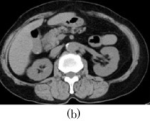Medullary sponge kidney is a benign congenital syndrome characterized by dilatation of collecting tubules in the renal papillae.
What is the Pathology of Medullary Sponge Kidney?
The pathology of medullary sponge kidney is:
-Etiology: The cause of medullary sponge kidney is unknown.
-Genes involved: Unknown.
-Pathogenesis: The sequence of events that lead to medullary sponge kidney unknown.
-Morphology: The morphology associated with medullary sponge kidney shows dilated ducts and small cysts.
-Histology: The histology associated with medullary sponge kidney shows cysts lined with cuboidal epithelium or transitional epithelium.
How does Medullary Sponge Kidney Present?
Patients with medullary sponge kidney typically affect more females than males present at the age range of 20 to 30 years. The symptoms, features, and clinical findings associated with medullary sponge kidney include asymptomatic, hematuria, UTI, urinary obstruction, and nephrolithiasis.
How is Medullary Sponge Kidney Diagnosed?
Medullary sponge kidney is diagnosed by radiological studies such as plain radiograph, excretory urogram and CT scan.
How is Medullary Sponge Kidney Treated?
Medullary sponge kidney is treated by symptomatic management medical care, surgery extracorporeal shock wave lithotripsy, percutaneous surgery, ureteroscopy.
What is the Prognosis of Medullary Sponge Kidney?
The prognosis of medullary sponge kidney is good; it is a benign condition with low mortality and morbidity.



